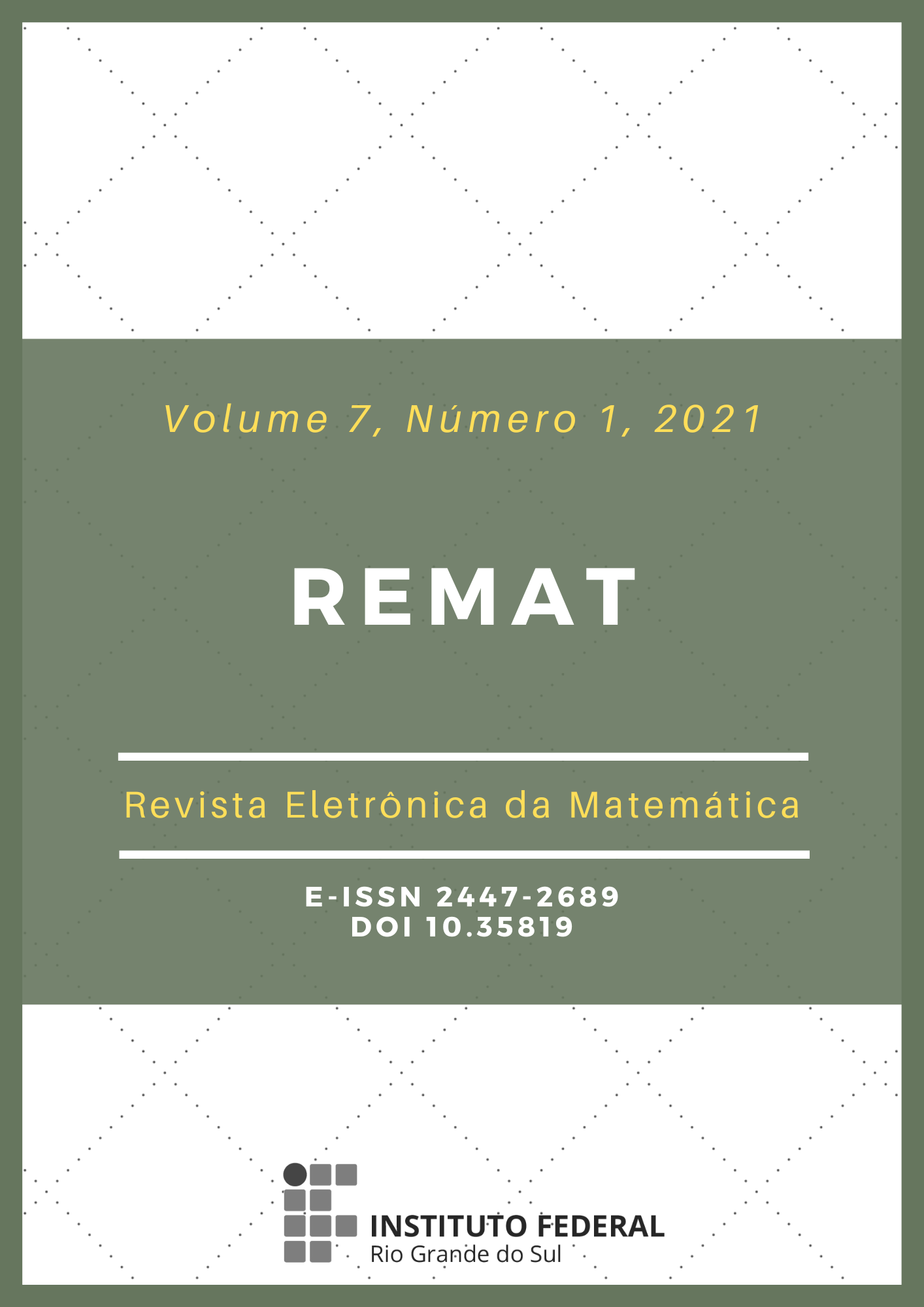Working on geometry topics with the help of the Geoplano: an experience with sixth grade students
DOI:
https://doi.org/10.35819/remat2021v7i1id4554Keywords:
Geoplane, Plane Geometry, Geometric Figures, LearningAbstract
Mathematics teaching has undergone significant changes. Traditional methods, previously accepted, based on the mere uncritical transmission of content through repetitive exercises and memorization of formulas, have been questioned due to their low contribution to the development of learning. In this context, the present article aims at using the Geoplano as a didactic tool in the work whit geometry topics and at analyzing the resourcefulness of the resourcefulness of a class of 6th grade students in an elementary school an elementary school while learning said topics using the aid of this resource. In conducting this qualitative study, we resorted to collaborative action research, where we draw on the experience of a participating classroom. The results show that there have been advances in students' learning levels regarding the studied geometric concepts. the involvement of students in classes was also verified, being possible to perceive the potentialities of application of the Geoplano as a didactic resource, mainly in the teaching of flat figures, areas, perimeter, similarities to flat figures, point, line and flat.
Downloads
References
BRASIL. Parâmetros Curriculares Nacionais: Matemática. Brasília: MEC/SEF, 1997.
BRASIL. Instituto Nacional de Estudos e Pesquisas Educacionais Anísio Teixeira (Inep). Relatório Brasil no PISA 2018: versão preliminar. Brasília, 2019. Disponível em: http://download.inep.gov.br/acoes_internacionais/pisa/documentos/2019/relatorio_PISA_2018_preliminar.pdf. Acesso em: 2 nov. 2020.
ESTEBAN, M. P. S. Pesquisa qualitativa em educação: fundamentos e tradições. Porto Alegre: AMGH, 2010.
FERREIRA, A. B. H. Novo dicionário Aurélio da Língua Portuguesa. 2. ed. Curitiba: Nova Fronteira, 1999.
FERRUGINE, S. S.; GUIMARÃES, S. S.; SOUZA, R. L. C. de; SOUZA, L. R. de; CASTRO, C. O., S. S. Geoplano: Uma forma interativa de aprender. In: CONGRESSO NACIONAL DE EDUCAÇÃO (CONEDU), 4., 2017, João Pessoa, PB. Anais [...]. Campina Grande: Realize Editora, 2017. Disponível em: https://editorarealize.com.br/artigo/visualizar/37092. Acesso em: 2 nov. 2020.
FOSSA, J. A. Teoria intuicionista da educação matemática. Natal: UFRN, 1998.
FREIRE, A. F.; RODRIGUES, F. S.; AQUINO, M. R. S.; SOARES, M. V.; GOIS, D. D. P. de; VIANA, J. D. O uso do Geoplano no ensino de geometria: cálculo de área e perímetro. Revista Científica Multidisciplinar Núcleo do Conhecimento, v. 3, ed. 6, ano 3, p. 119-135, jun. 2018. Disponível em: https://www.nucleodoconhecimento.com.br/matematica/calculo-de-area-e-perimetro. Acesso em: 2 nov. 2020.
KNIJNIK, G.; BASSO, M. V.; KLÜSENER, R. Aprendendo e ensinando Matemática com o Geoplano. 2. ed. Ijuí, RS: Unijuí, 1996.
LEAL, M. C.; CHIEREGATTO, L. C. Um estudo bibliográfico sobre a influência das práticas de laboratório para o ensino de Ciências e Matemática: uma relação professor/aluno. Revista de Comunicação Científica, Juara, v. 3, n. 1, p. 67-78, jul./dez. 2018. Disponível em: https://periodicos.unemat.br/index.php/rcc/article/view/3096. Acesso em: 22 mar. 2021.
MACHADO, R. M. Minicurso: Explorando o Geoplano. In: BIENAL DA SOCIEDADE BRASILEIRA DE MATEMÁTICA, 2., 25 a 29 out. 2004, Salvador. Anais [...]. Salvador: UFBA, Instituto de Matemática. Disponível em: http://www.bienasbm.ufba.br/M11.pdf. Acesso em: 12 nov. 2020.
NACARATO, A. M. Eu trabalho primeiro no concreto. Revista de Educação Matemática, São Paulo, v. 9, n. 9-10, p. 1- 6. 2005. Disponível em: https://www.revistasbemsp.com.br/REMat-SP/article/view/76. Acesso em: 22 mar. 2021.
OLIVEIRA, M. M. Como fazer pesquisa qualitativa. 4. ed. Petrópolis: Vozes, 2012.
PARANÁ. Secretaria de Estado da Educação do Paraná. Diretrizes Curriculares de Matemática. Curitiba: SEED, 2008. Disponível em: http://www.educadores.diaadia.pr.gov.br/arquivos/File/diretrizes/dce_mat.pdf. Acesso em: 11 nov. 2020.
PARANÁ. Secretaria de Estado da Educação do Paraná. Os desafios da escola pública paranaense na perspectiva do professor PDE: produções didático-pedagógicas. Curitiba: SEED, 2013.
RODRIGUES, F. C.; GAZIRE, E. S. Reflexões sobre uso de material didático manipulável no ensino de Matemática: da ação experimental à reflexão. Revemat: Revista Eletrônica de Educação Matemática, Florianópolis, v. 7, n. 2, p. 187-196, 2012. DOI: http://dx.doi.org/10.5007/1981-1322.2012v7n2p187.
SILVA, A. C. S.; SOUZA, J. K. C. Geoplano e o cálculo de área de figuras planas: reflexões de uma intervenção pedagógica. In: JORNADA DE ESTUDOS EM MATEMÁTICA, 2., 2016, Marabá, PA. Anais [...]. Marabá: Unifesspa, 2016. Disponível em: https://jem.unifesspa.edu.br/images/2JEM/ANAIS/CC/O_geoplano_e_o_clculo_de_rea.pdf. Acesso em: 15 maio 2018.
SILVA, L. P. M. O que é geometria? Brasil Escola. Disponível em: https://brasilescola.uol.com.br/o-que-e/matematica/o-que-e-geometria.htm. Acesso em: 12 nov. 2020.
ZAPPELLINI, M. B.; FEUERSCHÜTTE, S. G. O uso da triangulação na pesquisa científica brasileira em administração. Administração: Ensino & Pesquisa, Rio de Janeiro, v. 16, n. 2, p. 241-273, abr./jun. 2015. DOI: https://dx.doi.org/10.13058/raep.2015.v16n2.238.
Downloads
Published
Issue
Section
License
Copyright (c) 2021 REMAT: Revista Eletrônica da Matemática

This work is licensed under a Creative Commons Attribution 4.0 International License.
REMAT retains the copyright of published articles, having the right to first publication of the work, mention of first publication in the journal in other published media and distribution of parts or of the work as a whole in order to promote the magazine.
This is an open access journal, which means that all content is available free of charge, at no cost to the user or his institution. Users are permitted to read, download, copy, distribute, print, search or link the full texts of the articles, or use them for any other legal purpose, without requesting prior permission from the magazine or the author. This statement is in accordance with the BOAI definition of open access.













 https://orcid.org/0000-0002-0893-7426
https://orcid.org/0000-0002-0893-7426


















